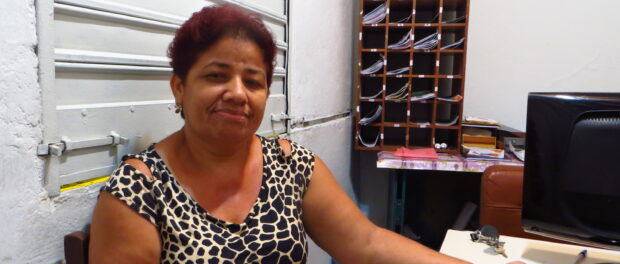
As Rio de Janeiro prepares for the Olympic Games in just over a year’s time, a trend is emerging with community activists being elected to head Neighborhood Associations in a number of favelas. Latest among them, Maria do Socorro was elected president of the Residents Association in favela Indiana Tijuca on June 7. Indiana is a small community of 600 people Rio’s near North Zone. Maria do Socorro’s election follows the victory of André Constantine in Babilônia; they are both members of the Favela Não Se Cala movement and outspoken activists.
Launching her candidacy at the last minute, Maria do Socorro pledged to commit the Association to fighting the ongoing threat of evictions in Indiana: “Our fight is all of this. It is to say that we are poor but we also have rights.”
The new president makes clear that the Association will now become a tool for residents to fight against eviction, which have long been threatening the community and have intensified since 2012. Located at the base of Morro do Borel in the middle-class Tijuca neighborhood, Indiana is considered an area of risk by the City due to its location next to a river. The City wants to relocate the residents to a Minha Casa Minha Vida public housing project in Triagem, 7kmaway. Before 2012 six houses were demolished and 110 families removed, but a court injunction prevented further actions on the grounds that the City failed to provide sufficient justification for removing the community.
Long-term resident and community organizer Inês Ferreira contests the allegations that Indiana is an area of risk and instead believes the eviction is due to “real-estate speculation—for another class of people to live here, because it is easy to expel favelados.” Inês echoes a sentiment shared across Rio’s favelas, and expressed by Tavares Bastos bar owner Bob Nadkarni, that the City is steadily working to clear residents out “one by one, thus opening the opportunity for real estate development.”
Newly elected Maria do Socorro is quick to emphasize that the fight against evictions is very much alive: “We do not have anything that states Indiana will not be evicted in the future. We fought during the World Cup and now the Olympics are coming up.”
An experienced organizer, marching in the mass protests of 2013 and regularly attending the Popular Committee for the World Cup and Olympics’ meetings, Maria is making sure that her term exemplifies the organizing and activism needed to fight eviction. She says: “I am going to involve people that really know what it is like to fight, what it is like to go to the street, what it is like to fight for their home.”
Maria represents a significant contrast to the last president. After 12 years in power, residents complained of lack of engagement and support for their cause, which resulted in the establishment of a separate Residents’ Committee,, “created to look within the community, criticize the Association when it did bad things and be in favor when they did something good,” explains Antônio Carlos, one of the founders of the Committee.
The Committee is a proactive group of residents who have taken important steps to protect their community, including creating a community newspaper, organizing meetings, and developing an upgrading plan for the community in collaboration with students from the Federal University of Rio de Janeiro (UFRJ). Malu, a student working on the project, explains it is “an urban upgrading plan to show that it is viable for Indiana to stay put.” Although a couple of houses are genuinely at risk, the plan is to preserve the community and “to have these people relocated within the community itself.”
Antônio Carlos explains that the Committee’s purpose is “to add to the fight. We are fighting for upgrading, for social rights.” The Committee looks forward to the prospect of working with an association that will stand with residents and protect the community—which it failed to do under previous leadership.
With the Olympics just over a year away, the residents of Indiana see no quick resolution to their housing problems. They also complain about the lack of services and upgrades their community should have received. The Association bemoans the limited resources available and is trying “to find something that occupies the children, as well as donations for the residents.” The leaders are calling out for donations of anything that could help their office or their residents. For example, last week they bought 26 milk cartons to give to families in need.
The firm distrust between residents and the City was only exacerbated by Mayor Eduardo Paes’ last visit to Indiana in 2013 when he promised there would be no more evictions, but afterwards failed to halt threats and provide guarantees.
To support Favela Indiana with donations, contact the Residents’ Association here or Maria Do Socorro via Facebook.



